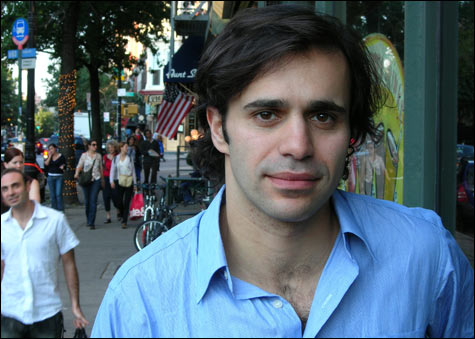
LAUGH LINES: Keith Gessen’s comic debut novel, All the Sad Young Literary Men, is about three Harvard boys. |
Sometimes good things really do arrive in small packages. This spring brings exciting story collections from established authors and hot newcomers. JHUMPA LAHIRI examines the Bengali-American cultural divide in Unaccustomed Earth (Knopf, April 1); CYNTHIA OZICK tests her characters’ limits in Dictation: A Quartet (Houghton, April 16). Vietnamese-born NAM LE travels far with The Boat (Knopf, May 13). Zimbabwe-based Jesuit UWEM AKPAN, who’s been featured in the New Yorker, honors Africa’s children in Say You’re One of Them (Little, Brown, June 9).
For fiction that thinks big, look to PETER MATTHIESSEN, who condenses his Watson Trilogy into the 917-page Shadow Country (Modern Library, April 8). RICHARDBAUSCH’s Peace (Knopf, April 18) sets three American soldiers on Monte Cassino in 1944, whereas the protagonist of DAVID GUTERSON’s The Other (Knopf, June 6) abandons his easy life for the wilderness. ANDRE DUBUS III’s The Garden of Last Days (Norton, June 2) visits a Florida stripper in September 2001 who entertains men with terror on their minds.
LOUISE ERDRICH’s The Plague of Doves (HarperCollins, April 29) addresses ongoing violence in a North Dakota town; JAMES FREY’s Bright Shiny Morning (HarperCollins, May 13), touted as his first novel, offers characters lost in Los Angeles. In a smaller frame, Elegant Variation blogger MARK SARVAS shows us Harry,Revised (Bloomsbury, April 15) after Harry’s wife’s death, and n + 1 founder KEITH GESSEN investigates the travails of Harvard post-grad life in All the Sad Young Literary Men (Viking, April 14).
Want an international perspective? In MA JIAN’s Beijing Coma (Farrar, Straus, June 4), a man laid low in Tiananmen Square awakens after 10 years to a new China. In How the Soldier Repairs the Gramophone (Grove, June 10), an award-winning debut from Germany with huge international sales, SASA STANISIC reflects on his homeland, Bosnia-Herzegovina. For historical reading pleasure, try URSULA LE GUIN’s Lavinia (Harcourt, April 21), which fleshes out the character of Aeneas’s Latium wife in Virgil’s Aeneid.
Non-fiction
Spring non-fiction takes a hard look at America with PHILIP GOUREVITCH & ERROL MORRIS’s Abu Ghraib study, Standard Operating Procedure (Penguin Press, May 15), and FAREED ZAKARIA’s views on The Post-American World (Norton, May 28). For historical context, try SEAN WILENTZ’s The Age of Reagan: A History, 1974–2008 (HarperCollins, May 6). TONY JUDT goes farther: in the 24 previously published essays that make up Reappraisals: Reflections on the Forgotten Century (Penguin Press, April 17), he uncovers this century’s roots in its predecessor.
Fascinated by life stories? GERMAINE GREER praises Anne Hathaway — not the Princess/Prada/Jane actress but Shakespeare’s Wife (HarperCollins, April 8). In The Man Who Loved China: Joseph Needham and the Making of a Masterpiece (HarperCollins, May 6), SIMON WINCHESTER revisits a crusading British scientist.
Authors telling their own stories include AUGUSTEN BURROUGHS in A Wolf at the Table: A Memoir of My Father (St. Martin’s, April 29) and ISABELLE ALLENDE in The Sum of Our Days (HarperCollins, April 1). V.S. NAIPAUL melds family and culture in A Writer’s People: Ways of Looking and Feeling (Knopf, April 29). For campaign relief, try TED SORENSEN’s Counselor: A Life at the Edge of History (HarperCollins, May 6).
Poetry
JOHN HOLLANDER illuminates our inner selves in his 19th collection, A Draft of Light (Knopf, May 17). JORIE GRAHAM twists through a dark literary landscape in SeaChange (Ecco, April 1). After a glowing debut, BRENDA SHAUGHNESSY returns with the affecting Human Dark with Sugar (Copper Canyon, June 1). And if you’ve missed multi-award-winner CAROLINE KNOX, try her brave and witty Quaker Guns (Wave, April 1).